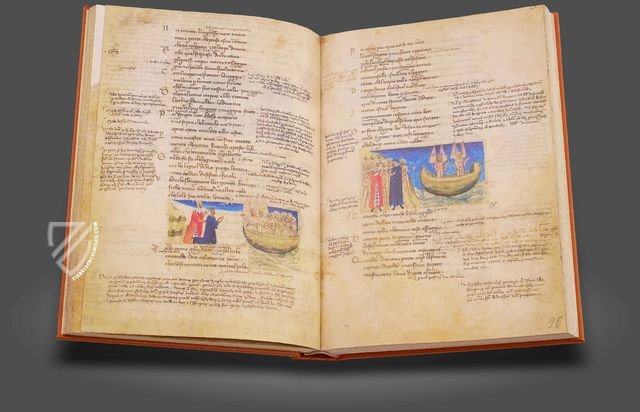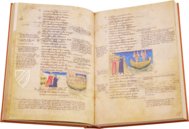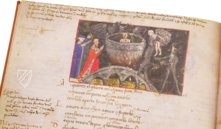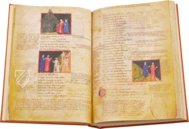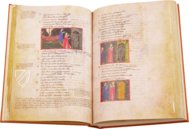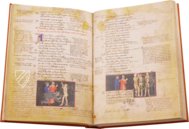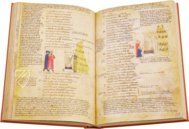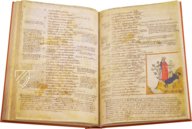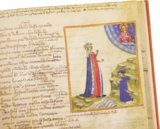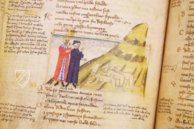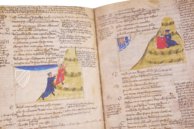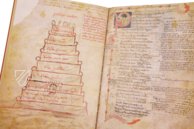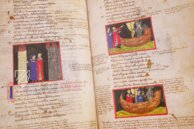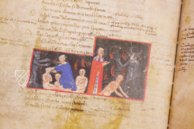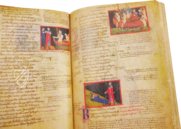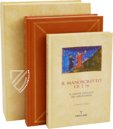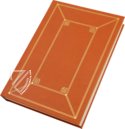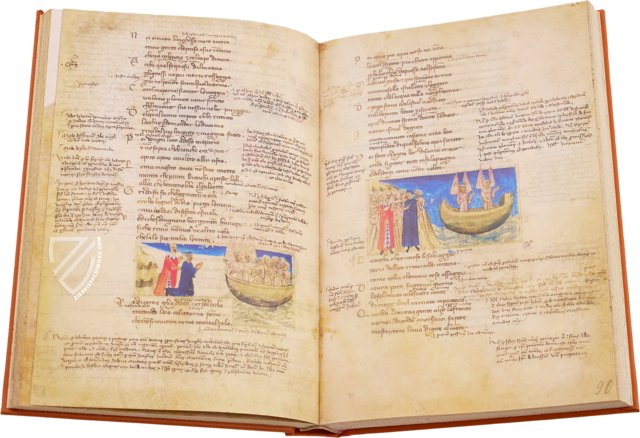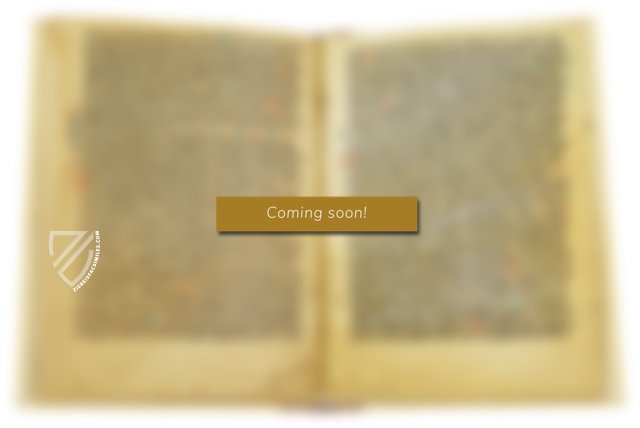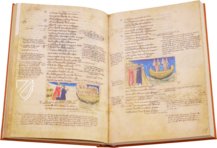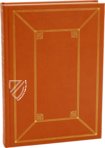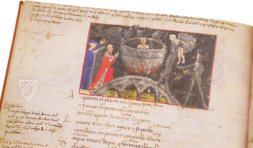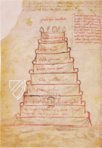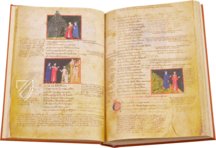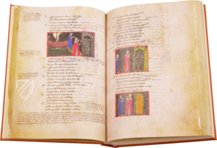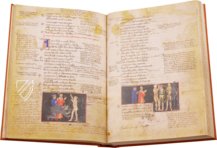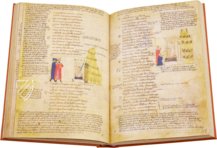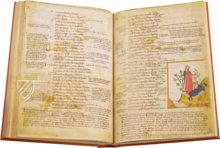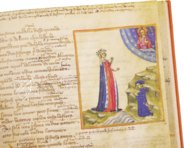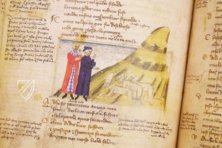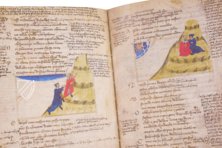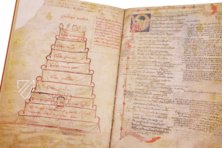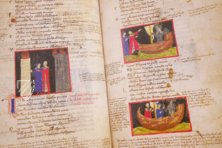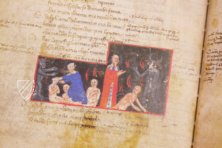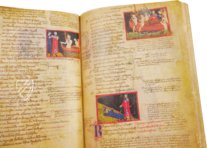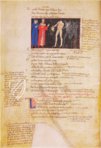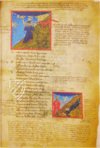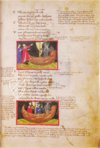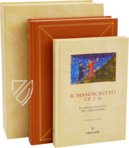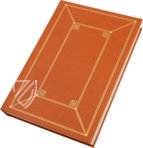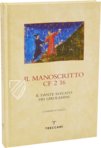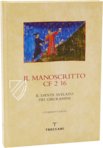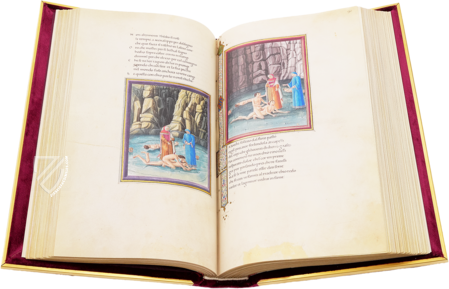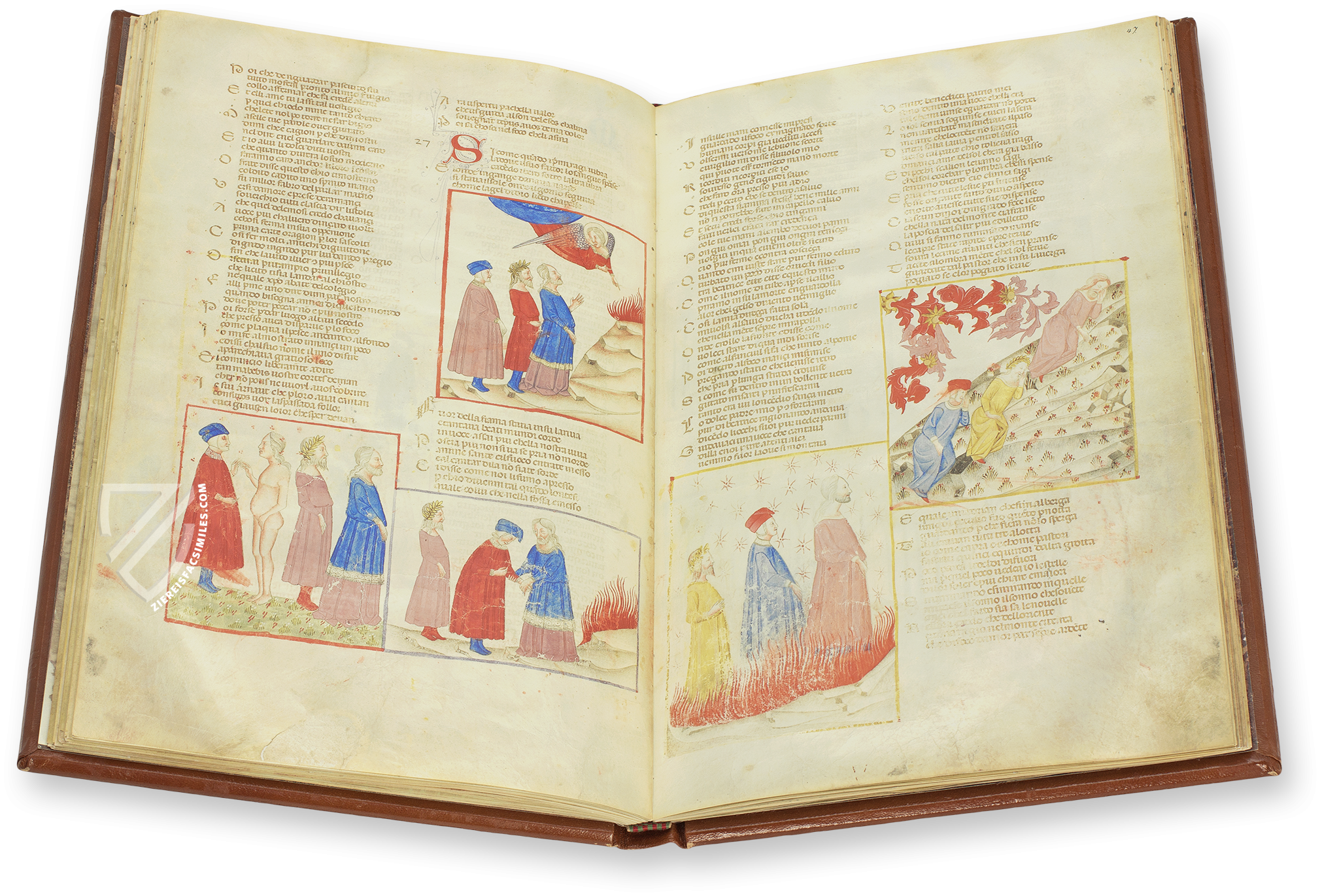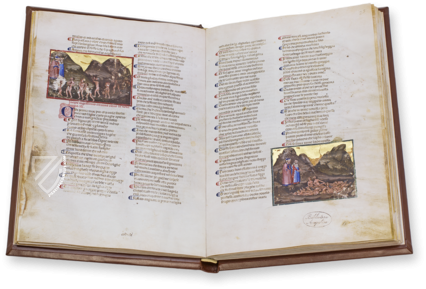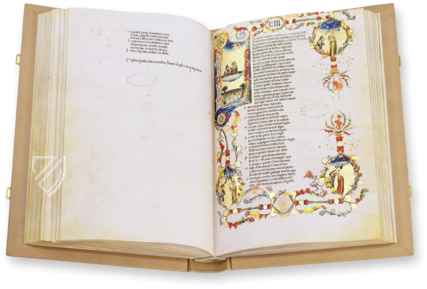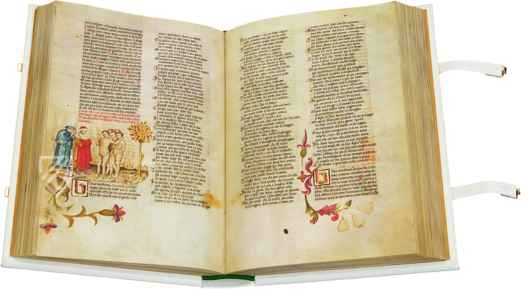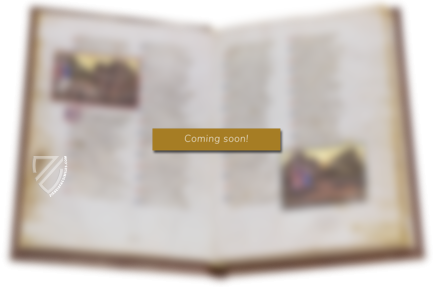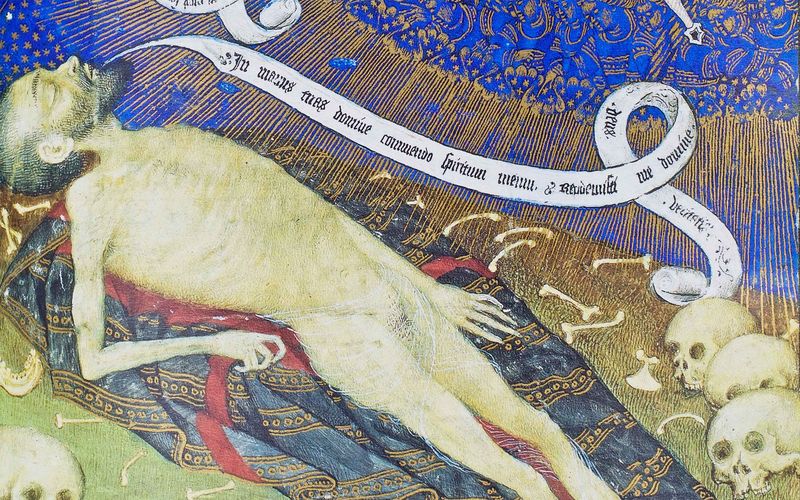Divine Comedy - Oratoriana Manuscript
(3,000€ - 7,000€)
The Oratoriana Manuscript is one of the oldest and therefore most significant surviving copies of the Opus Magnum by Dante Alighieri (1265-1321). The richly illuminated luxury manuscript of the famous Divine Comedy was created around 1350 by an anonymous Florentine illuminator. The wealthy patron, indicated only by a coat of arms, may have been a learned member of the influential Neapolitan noble family Polderico. The extensive glosses in the margins, which are a fascinating testimony to the heavy and intensive use of the manuscript, could have been written by this person. With 146 medium-sized Trecento miniatures, which extend over the first two parts of the text, the codex is extraordinarily magnificently illuminated for its age, with the Inferno images with their ghostly black backgrounds standing out in particular. The miniature cycle is an important pictorial testimony to the development of Dante iconography and without question makes the manuscript one of the most fascinating editions of this world-class literary masterpiece.
Divine Comedy - Oratoriana Manuscript
Around one hundred of the approximately 800 surviving manuscripts of the famous Divina Commedia contain drawn or painted book decoration. Of these, the Neapolitan Codex Filippino or Oratoriana Manuscript ranks as the most important southern Italian manuscript. The famous epic poem and main work of the Italian world-class poet and writer Dante Alighieri (1265-1321), which was written between 1307 and Dante's death in 1321, is of extraordinary importance for the Italian language and literary history.
It tells the story of two travelers, the ancient poet Vergil (70-29 BC) and the first-person narrator Dante, who descend to Hell (Inferno), then climb the Mountain of Purgatory (Purgatorio) and finally reach Paradise (Paradiso). On this journey, the narrator Dante meets around 600 souls from mythology, poetry and history, who - depending on their individual earthly merit or misdemeanor - have to endure various punishments in hell or are allowed to dwell in heaven. Over the centuries, the work has generated an enormous history of reception and has influenced countless poets, thinkers, artists and other creative spirits to this day.
A Neapolitan Masterpiece
The manuscript of the Divine Comedy known as the Oratoriana Manuscript owes its name to its location in the Biblioteca Oratoriana dei Girolamini in Naples, the former monastery library of the Oratorians, who were once commonly referred to as the “Philippians” after the founder of the Congregation of the Oratory - Filippo Romolo Neri (1515-1595). The manuscript, which is kept there under the shelfmark C.F. 2.16, is one of the oldest surviving Dante manuscripts, dating from around 1350 in Naples. It is one of a small group of manuscripts that cannot be assigned to any particular line of tradition and is richly illuminated. Particularly noteworthy are the numerous and extensive glosses inserted in the margins by various hands, which provide fascinating insights into the history of the manuscript's use as a study tool.
Trecento Illumination
The Codex Filippino is illuminated with astonishing 146 medium-sized miniatures by the hand of a Florentine book artist, which are intended to help the reader interpret the events described in the text. Remarkably, the cantos about paradise were not illuminated. The framed miniatures showing scenes in hell, on the other hand, are particularly impressive due to their black background.
The illumination also includes a coat of arms in the bas-de-page of the first page. It belongs to the influential Neapolitan noble family Polderico. Who exactly commissioned the manuscript and whether the coat of arms actually belongs to the patronage of the manuscript or only to a later owner cannot be said with certainty. However, the most likely theory is that it was created for the jurist Lorenzo Poderico, who, as rector of the University of Naples and advisor to Queen Joan I of Anjou, was considered one of the most learned men of his time.
Codicology
- Alternative Titles
- Göttliche Komödie - Codex Filippino
Dante Girolamini
Codex Filippino of the Divine Comedy - Size / Format
- 490 pages / 28.0 × 19.5 cm
- Origin
- Italy
- Date
- 1350
- Epochs
- Style
- Genre
- Script
- Gothic cursiva
- Illustrations
- 146 narrative miniatures, 2 historiated initials with sprawling marginal extensions, and numerous pen-flourish initials
- Content
- Divine Comedy
- Artist / School
- Dante Alighieri (ca. 1265 – 1321) (author)
Divine Comedy - Oratoriana Manuscript
Dante and Virgil Meet Bertran de Born
In Canto XXXVIII of the Inferno, Dante and Virgil meet various Sowers of Discord in the eight circle of Hell, the last of whom is a knight carrying his own severed head by the hair and swings it like a lantern. He is identified as Bertrand de Born (1140–1215), a French baron accused of fomenting rebellion against King Henry II of England, who ruled over large swathes of France, by his son Henry the Young King. For having divided a father from his son, Bertrand has his head severed from his body.
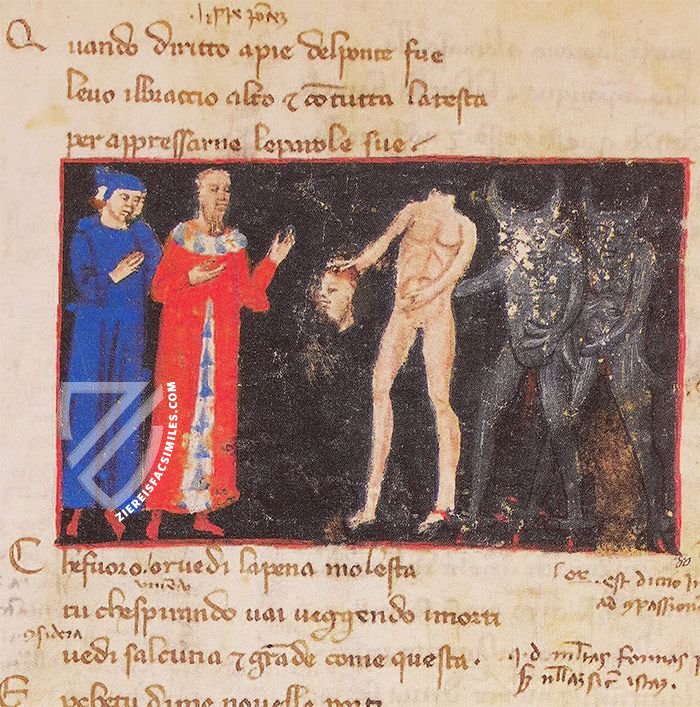
Divine Comedy - Oratoriana Manuscript
Diagram of the Mountain of Purgatory
According to Dante, Purgatory is a mountain that is the only landmass in the Southern Hemisphere and is on the opposite side of the world from Jerusalem. After climbing through a narrow chasm to escape from Hell, the two poets emerge at the base of the Mountain of Purgatory on the morning of Easter Sunday. This red and black pen drawing illustrates the climb they must make.
The bottom two levels below the entrance to Purgatory proper, depicted as a fortified gate, are the Ante-Purgatory, which house the excommunicated and the late-repentant who still cling to earthly life. They are followed by the seven terraces of Purgatory, which are associated with the seven deadly sins (in order): Pride, Envy, Wrath, Sloth, Greed , Gluttony, and Lust.
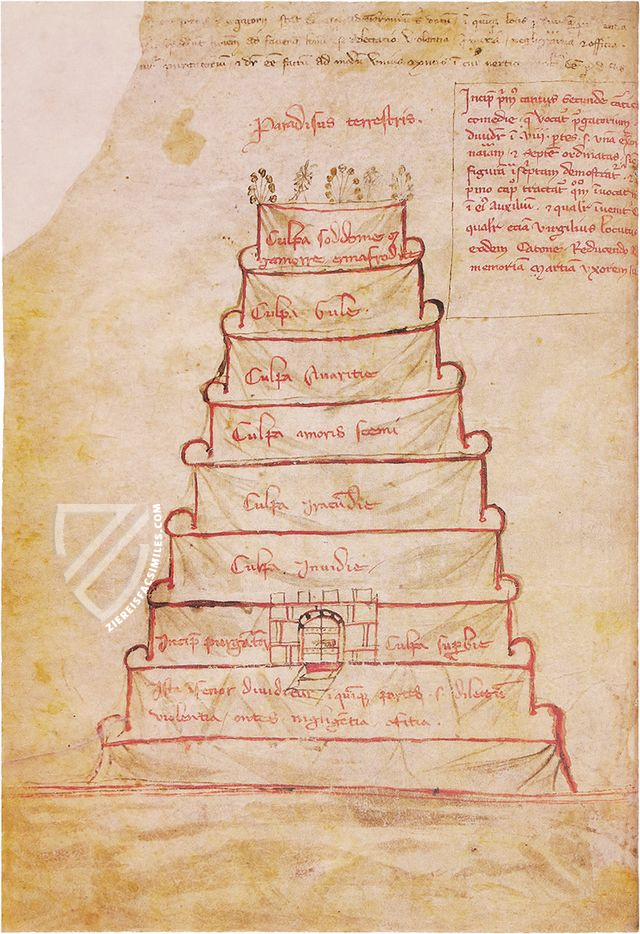
#1 Il Dante svelato dei Girolamini
Language: Italian
(3,000€ - 7,000€)
#2 Il Codice Filippino della Commedia di Dante Alighieri
(3,000€ - 7,000€)
- Treatises / Secular Books
- Apocalypses / Beatus
- Astronomy / Astrology
- Bestiaries
- Bibles / Gospels
- Chronicles / History / Law
- Geography / Maps
- Saints' Lives
- Islam / Oriental
- Judaism / Hebrew
- Single Leaf Collections
- Leonardo da Vinci
- Literature / Poetry
- Liturgical Manuscripts
- Medicine / Botany / Alchemy
- Music
- Mythology / Prophecies
- Psalters
- Other Religious Books
- Games / Hunting
- Private Devotion Books
- Other Genres
- Afghanistan
- Armenia
- Austria
- Belgium
- Belize
- Bosnia and Herzegovina
- China
- Colombia
- Costa Rica
- Croatia
- Cyprus
- Czech Republic
- Denmark
- Egypt
- El Salvador
- Ethiopia
- France
- Germany
- Greece
- Guatemala
- Honduras
- Hungary
- India
- Iran
- Iraq
- Israel
- Italy
- Japan
- Jordan
- Kazakhstan
- Kyrgyzstan
- Lebanon
- Liechtenstein
- Luxembourg
- Mexico
- Morocco
- Netherlands
- Palestine
- Panama
- Peru
- Poland
- Portugal
- Romania
- Russia
- Serbia
- Spain
- Sri Lanka
- Sweden
- Switzerland
- Syria
- Tajikistan
- Turkey
- Turkmenistan
- Ukraine
- United Kingdom
- United States
- Uzbekistan
- Vatican City
- A. Oosthoek, van Holkema & Warendorf
- Aboca Museum
- Ajuntament de Valencia
- Akademie Verlag
- Akademische Druck- u. Verlagsanstalt (ADEVA)
- Aldo Ausilio Editore - Bottega d’Erasmo
- Alecto Historical Editions
- Alkuin Verlag
- Almqvist & Wiksell
- Amilcare Pizzi
- Andreas & Andreas Verlagsbuchhandlung
- Archa 90
- Archiv Verlag
- Archivi Edizioni
- Arnold Verlag
- ARS
- Ars Magna
- Ars Millenii
- Art Market
- ArtCodex
- AyN Ediciones
- Azimuth Editions
- Badenia Verlag
- Bärenreiter-Verlag
- Belser Verlag
- Belser Verlag / WK Wertkontor
- Benziger Verlag
- Bernardinum Wydawnictwo
- BiblioGemma
- Biblioteca Apostolica Vaticana (Vaticanstadt, Vaticanstadt)
- Bibliotheca Palatina Faksimile Verlag
- Bibliotheca Rara
- Boydell & Brewer
- Bramante Edizioni
- Bredius Genootschap
- Brepols Publishers
- British Library
- C. Weckesser
- Caixa Catalunya
- Canesi
- CAPSA, Ars Scriptoria
- Caratzas Brothers, Publishers
- Carus Verlag
- Casamassima Libri
- Centrum Cartographie Verlag GmbH
- Chavane Verlag
- Christian Brandstätter Verlag
- Circulo Cientifico
- Club Bibliófilo Versol
- Club du Livre
- Club Internacional del Libro
- CM Editores
- Collegium Graphicum
- Collezione Apocrifa Da Vinci
- Comissão Nacional para as Comemorações dos Descobrimentos Portugueses
- Coron Verlag
- Corvina
- CTHS
- D. S. Brewer
- Damon
- De Agostini/UTET
- De Nederlandsche Boekhandel
- De Schutter
- Deuschle & Stemmle
- Deutscher Verlag für Kunstwissenschaft
- DIAMM
- Dropmore Press
- Droz
- E. Schreiber Graphische Kunstanstalten
- Ediciones Boreal
- Ediciones Grial
- Ediclube
- Edições Inapa
- Edilan
- Editalia
- Edition Deuschle
- Edition Georg Popp
- Edition Leipzig
- Edition Libri Illustri
- Editiones Reales Sitios S. L.
- Éditions de l'Oiseau Lyre
- Editions Medicina Rara
- Editorial Casariego
- Editorial Mintzoa
- Editrice Antenore
- Editrice Velar
- Edizioni Edison
- Egeria, S.L.
- Eikon Editores
- Electa
- Emery Walker Limited
- Enciclopèdia Catalana
- Eos-Verlag
- Ephesus Publishing
- Ernst Battenberg
- Eugrammia Press
- Extraordinary Editions
- Fackelverlag
- Facsimila Art & Edition
- Facsimile Editions Ltd.
- Facsimilia Art & Edition Ebert KG
- Faksimile Verlag
- Feuermann Verlag
- Folger Shakespeare Library
- Franco Cosimo Panini Editore
- Friedrich Wittig Verlag
- Fundación Hullera Vasco-Leonesa
- G. Braziller
- Gabriele Mazzotta Editore
- Gebr. Mann Verlag
- Gesellschaft für graphische Industrie
- Getty Research Institute
- Giovanni Domenico de Rossi
- Giunti Editore
- Goldenmark Librarium
- Graffiti
- Grafica European Center of Fine Arts
- Guido Pressler
- Guillermo Blazquez
- Gustav Kiepenheuer
- H. N. Abrams
- Harrassowitz
- Harvard University Press
- Helikon
- Hendrickson Publishers
- Henning Oppermann
- Herder Verlag
- Hes & De Graaf Publishers
- Hoepli
- Holbein-Verlag
- Houghton Library
- Hugo Schmidt Verlag
- Idion Verlag
- Il Bulino, edizioni d'arte
- ILte
- Imago
- Insel Verlag
- Insel-Verlag Anton Kippenberger
- Instituto de Estudios Altoaragoneses
- Instituto Nacional de Antropología e Historia
- Introligatornia Budnik Jerzy
- Istituto dell'Enciclopedia Italiana - Treccani
- Istituto Ellenico di Studi Bizantini e Postbizantini
- Istituto Geografico De Agostini
- Istituto Poligrafico e Zecca dello Stato
- Italarte Art Establishments
- Jaca Book
- Jan Thorbecke Verlag
- Johnson Reprint Corporation
- Johnson Reprint Corporation
- Josef Stocker
- Josef Stocker-Schmid
- Jugoslavija
- Karl W. Hiersemann
- Kasper Straube
- Kaydeda Ediciones
- Kindler Verlag / Coron Verlag
- Kodansha International Ltd.
- Konrad Kölbl Verlag
- Kurt Wolff Verlag
- La Liberia dello Stato
- La Linea Editrice
- La Meta Editore
- Lambert Schneider
- Landeskreditbank Baden-Württemberg
- Leo S. Olschki
- Les Incunables
- Liber Artis
- Library of Congress
- Libreria Musicale Italiana
- Lichtdruck
- Lito Immagine Editore
- Lumen Artis
- Lund Humphries
- M. Moleiro Editor
- Maison des Sciences de l'homme et de la société de Poitiers
- Manuscriptum
- Martinus Nijhoff
- Maruzen-Yushodo Co. Ltd.
- MASA
- Massada Publishers
- McGraw-Hill
- Metropolitan Museum of Art
- Militos
- Millennium Liber
- Müller & Schindler
- Nahar - Stavit
- Nahar and Steimatzky
- National Library of Wales
- Neri Pozza
- Nova Charta
- Oceanum Verlag
- Odeon
- Omnia Arte
- Orbis Mediaevalis
- Orbis Pictus
- Österreichische Staatsdruckerei
- Oxford University Press
- Pageant Books
- Parzellers Buchverlag
- Patrimonio Ediciones
- Pattloch Verlag
- PIAF
- Pieper Verlag
- Plon-Nourrit et cie
- Poligrafiche Bolis
- Presses Universitaires de Strasbourg
- Prestel Verlag
- Princeton University Press
- Prisma Verlag
- Priuli & Verlucca, editori
- Pro Sport Verlag
- Propyläen Verlag
- Pytheas Books
- Quaternio Verlag Luzern
- Reales Sitios
- Recht-Verlag
- Reichert Verlag
- Reichsdruckerei
- Reprint Verlag
- Riehn & Reusch
- Roberto Vattori Editore
- Rosenkilde and Bagger
- Roxburghe Club
- Salerno Editrice
- Saltellus Press
- Sandoz
- Sarajevo Svjetlost
- Schöck ArtPrint Kft.
- Schulsinger Brothers
- Scolar Press
- Scrinium
- Scripta Maneant
- Scriptorium
- Shazar
- Siloé, arte y bibliofilia
- SISMEL - Edizioni del Galluzzo
- Sociedad Mexicana de Antropología
- Société des Bibliophiles & Iconophiles de Belgique
- Soncin Publishing
- Sorli Ediciones
- Stainer and Bell
- Studer
- Styria Verlag
- Sumptibus Pragopress
- Szegedi Tudomànyegyetem
- Taberna Libraria
- Tarshish Books
- Taschen
- Tempus Libri
- Testimonio Compañía Editorial
- TGB Limited Editions
- Thames & Hudson
- Thames and Hudson
- The Clear Vue Publishing Partnership Limited
- The Facsimile Codex
- The Folio Society
- The Marquess of Normanby
- The Orphan Hospital Ward of Israel
- The Richard III and Yorkist History Trust
- The Warburg Institute
- Tip.Le.Co
- TouchArt
- TREC Publishing House
- TRI Publishing Co.
- Trident Editore
- Tuliba Collection
- Typis Regiae Officinae Polygraphicae
- Union Verlag Berlin
- Universidad de Granada
- Universitaire Bibliotheken Leiden
- University of California Press
- University of Chicago Press
- Urs Graf
- Urs Graf Verlag
- Vallecchi
- Van Wijnen
- VCH, Acta Humaniora
- VDI Verlag
- VEB Deutscher Verlag für Musik
- Verlag Anton Pustet / Andreas Verlag
- Verlag Bibliophile Drucke Josef Stocker
- Verlag der Münchner Drucke
- Verlag für Regionalgeschichte
- Verlag Styria
- Vicent Garcia Editores
- W. Turnowski Ltd.
- W. Turnowsky
- Waanders Printers
- Wiener Mechitharisten-Congregation (Wien, Österreich)
- Wissenschaftliche Buchgesellschaft
- Wissenschaftliche Verlagsgesellschaft
- Wydawnictwo Dolnoslaskie
- Xuntanza Editorial
- Zakład Narodowy
- Zollikofer AG

